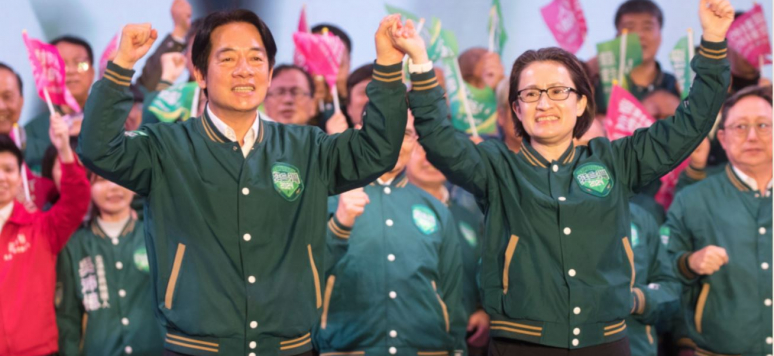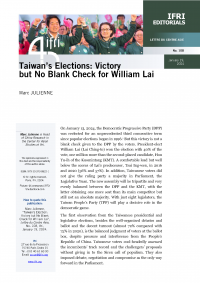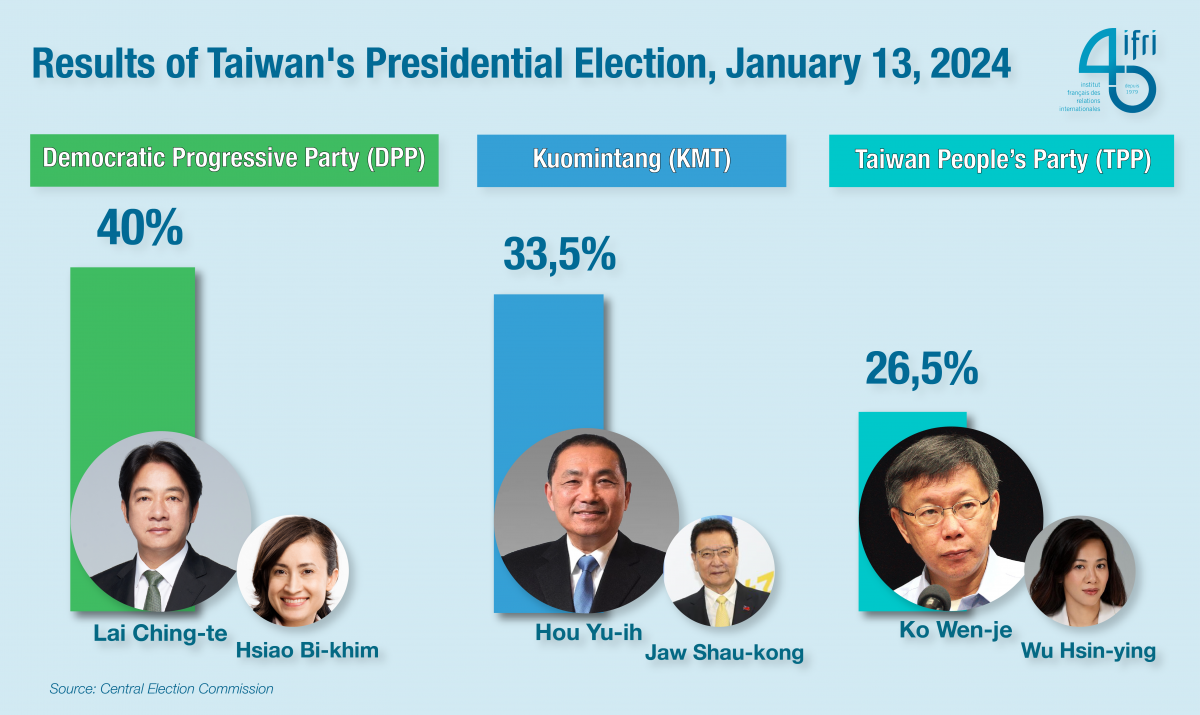
Taiwan's Elections: Victory but No Blank Check for William Lai Lettre du Centre Asie, No. 108, January 19, 2024
On January 13, 2024, the Democratic Progressive Party (DPP) was reelected for an unprecedented third consecutive term since popular elections began in 1996.

But this victory is not a blank check given to the DPP by the voters. President-elect William Lai (Lai Ching-te) won the election with 40% of the vote, one million more than the second-placed candidate, Hou Yu-ih of the Kuomintang (KMT). A comfortable lead but well below the scores of Lai’s predecessor, Tsai Ing-wen, in 2016 and 2020 (56% and 57%). In addition, Taiwanese voters did not give the ruling party a majority in Parliament, the Legislative Yuan. The new assembly will be tripartite and very evenly balanced between the DPP and the KMT, with the latter obtaining one more seat than its main competitor but still not an absolute majority. With just eight legislators, the Taiwan People’s Party (TPP) will play a decisive role in the democratic game.
The first observation from the Taiwanese presidential and legislative elections, besides the well-organized debates and ballot and the decent turnout (almost 72% compared with 75% in 2020), is the balanced judgment of voters at the ballot box, despite pressure and interference from the People’s Republic of China. Taiwanese voters cool-headedly assessed the incumbents’ track record and the challengers’ proposals without giving in to the Siren call of populism. They also imposed debate, negotiation and compromise as the only way forward in the Parliament.
Presidential election: the sources of victory... and defeat
The DPP victory can be assessed both positively and negatively. First, the DPP benefited from the generally favorable track record of Tsai Ing-wen’s eight years as President. In particular, she proposed a new approach to the question of independence, considering that an overt declaration was no longer needed as it is a de facto reality. Despite the defection of several diplomatic allies (most recently Nauru, on the day after the election), she has significantly strengthened Taiwan’s image and role on the international stage, as well as economic, scientific, and cultural relations with many democracies. In the field of defense, Tsai has pursued major indigenous weapons programs (submarines, destroyers, and drones, for instance), promoted the development of asymmetric defense capabilities, and extended compulsory military service from four to twelve months. She also gave new impetus to Taiwan’s space program by creating a new agency (Taiwan Space Agency, TASA) to stimulate the industry. Her opponents hardly questioned all these measures during the campaign. Her economic record is more controversial, but her handling of the COVID-19 crisis and China’s economic coercion is also generally positive, particularly her policy of relocating and diversifying trade and investment toward Southeast Asia.
On the negative side, the DPP was also elected thanks to the absence of ambitious and innovative proposals to arouse renewed interest in politics within society and rally a majority of voters.
The KMT remains an aging party (its presidential and vice-presidential candidates were the oldest in the race), struggling to renew itself and adapt to societal changes. Nor does the party succeed in proposing political innovations. Concerning the relationship with Beijing, for example, on which a clear contrast was expected, the KMT was unable –or unwilling– to clarify its method of cooperating with China or its position on the “1992 consensus”. What’s more, three days before the election, former President Ma Ying-Jeou (from the KMT) told German media outlet Deutsche Welle that Xi Jinping was to be “trusted” on cross-strait relations and that he didn’t think Xi Jinping was “pushing for unification”. This statement, a godsend for the DPP, was probably the final blow to the KMT candidates, even though they had broken away from the former president.
With more than a quarter of the vote, TPP candidate Ko Wen-je pursues his rise on the Taiwanese political scene. Drawing on his experience as a doctor, he proposed a scientific and non-ideological approach to politics that appealed strongly to engineers, doctors, and professionals in the hard sciences, while antagonizing an electorate trained in the social sciences, for whom politics does not function like a human body. Despite his scientific vision of politics, his campaign has failed to present an articulated political vision and concrete proposals with fickle positions. Finally, the failed coalition attempt with the KMT in November and some misogynistic statements dented his image. Posing as an alternative to the traditional parties proved insufficient to build a program and did not provide him with enough credibility in the eyes of most of the public.
Nonetheless, Ko deserves credit for having been able to speak to and mobilize a young electorate and for having met the expectations of a population that no longer recognizes itself in the traditional parties. In this way, he pressures the DPP and the KMT to take a healthy look at themselves, which can only lead to a positive evolution in the political scene.
Faced with a divided and unconvincing opposition, the DPP passed the presidential election obstacle without a hitch. However, the victory is not a landslide. The absence of a majority in the Legislative Yuan should compel the future government to show humility, address more resolutely the pressing domestic issues for the population (housing, wages, jobs), and improve its ability to speak to the youth and find compromises with the opposition.
The TPP at the core of the democratic game in the Legislative Yuan
Above all, the most crucial aspect of this election is the TPP’s new central role in the Legislative Yuan. The KMT won the majority (52) but with only one seat more than the DPP (51). It will probably benefit from the support of the two independent legislators who are pan-blue but will not achieve an absolute majority (57 votes). Thus, with only eight legislators elected (three more than in the last legislature), the TPP becomes the epicenter of Parliament and will weigh heavily in the debates. Now, the kingmakers, the TPP legislators, will be unavoidable in voting laws and budgets, approving political appointees of the government (the Executive Yuan), and electing the President of the Legislative Yuan, a key position.
The 11th parliamentary term, which begins on February 1st, will be the real test for the TPP, which must demonstrate unity and responsibility. Attention will be drawn to the party’s eight legislators; their role in the debate and their votes will be scrutinized. Ko Wen-je, who no longer has a political mandate other than that of his own party’s chairmanship, will have to confirm his role as leader of the country’s third political force, and build loyalty and broaden his electoral base in the run-up to the local elections in 2026 and the general elections in 2028.
As such, the next four years represent an opportunity for the TPP to progress, professionalize, and recruit while at the same time running the risk of exposing its internal dissensions and indecisions. In other words, this mandate could be both a springboard or a trapdoor for the TPP and Ko Wen-je on the road to the next presidential election.
The first significant test is the appointment of the President of the Legislative Yuan. The KMT is proposing Han Kuo-yu, the unsuccessful candidate of the 2020 presidential election, known for his divisive and provocative nature, as its candidate. The DPP is proposing to reappoint the current President of the Legislative Yuan, You Si-kun, but as it is in the minority, he is unlikely to succeed. It will, therefore, be the votes of the eight TPP MPs that will be decisive in favor of the KMT or DPP candidate, and they will most likely manage to secure the post of Vice-President for themselves in the process. Another bold but realistic alternative is that the TPP and the DPP could reach an agreement against Han Kuo-yu by electing the TPP’s caucus leader, Huang Shan-shan, as President of the Legislative Yuan. This would be the lesser of two evils for the DPP, a tour de force for the TPP and the first woman in history to hold the post.



